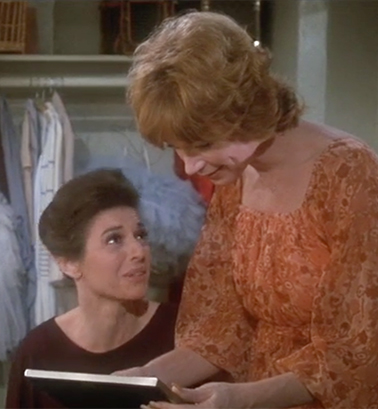 Bancroft & Maclaine reminisce in The Turning PointBest Shot 1977 Party. Chapter 2
Bancroft & Maclaine reminisce in The Turning PointBest Shot 1977 Party. Chapter 2
The Turning Point (1977)
Directed by: Herbert Ross
Cinematography by: Robert Surtees
When The Turning Point is remembered today, on the rare occasion that you hear it name-checked, it is nearly always in connection to its status as Oscar's all time loser (11 nominations without a win). That "achievement" was later shared when Steven Spielberg's The Color Purple (1985) met the same Oscar fate, entering the competition as a very big ticket and coming away empty-handed. It's surely no coincidence that both films are women's pictures. Oscar has grown increasingly wary of films about and for women over their 88 year history; that's not a mark on the films themselves but a stain on film culture and the Oscars. 1977 was in some significant ways, the very last Oscar year to be dominated by women. The sole "boys" movie up for the top prize was Star Wars, which perhaps also not coincidentally became the film which most Hollywood films aspired to be thereafter. Yes, 80% of the Best Picture nominees in 1977 were actually about women. Can you imagine it?!? That's a huge percentage which has, alas, not happened again in the 39 years since. Most Best Picture years since have been the reverse of those numbers, when in a more sane world it'd be about 50/50 since, you know, that's actually how the human race breaks down.
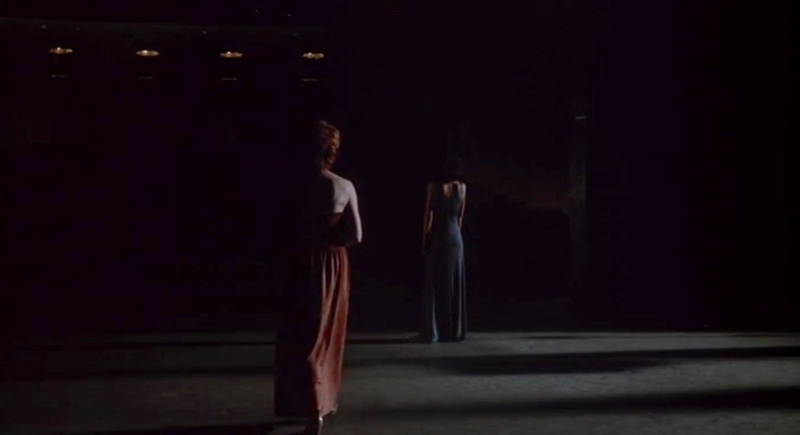 Bronze. I think this is trying to be the film's signature image, but there are two many climaxes preceding it and following it to quite pull it off.
Bronze. I think this is trying to be the film's signature image, but there are two many climaxes preceding it and following it to quite pull it off.
But now we're straying into Oscar stats when what we really want to talk about is this ballet melodrama and its gauzy prettiness. Worthy of 11 Oscar nominations? Surely not but that's not because of its subject, its genre, or its cast of accomplished women...
The still rising director Herbert Ross (best known today, arguably, as the director who warred with Julia Roberts on Steel Magnolias) had come to fame on Goodbye Mr Chips (1969) and two Barbra Streisand movies (Funny Lady & The Owl & The Pussycat) but 1977 was undoubtedly his career peak. He directed not one but two of the five Best Picture nominees that year (The Goodbye Girl & The Turning Point). The cinematographer Robert Surtees, on the other hand, came to The Turning Point late in his very illustrious career, already a three time Oscar winner. One imagines it's the theatrically lit dance sequences (and there are a lot of them, even if few are given room to really breathe) that secured the nomination but I've opted not to focus on them lest we simply be sighing and sharing 43 photos of Mikhail Baryshnikov in his prime. (Good god, that man.)
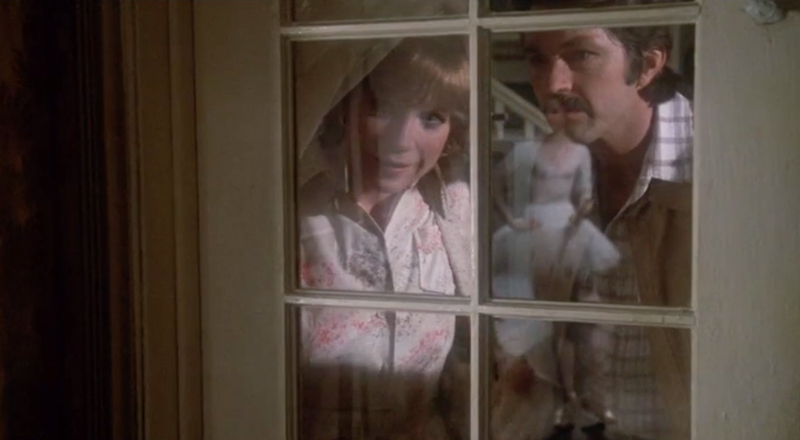 Silver. Four characters and many of the film's themes intermingling playfully...
Silver. Four characters and many of the film's themes intermingling playfully...
And besides, The Turning Point is more of a soap opera than a ballet drama, however much it thinks of itself as the latter. If the film had been more focused and self aware (the movie has way too many characters and too many competing arcs going on it might have really embraced this beautiful shot above which is preceded by a beautifully casual line of dialogue.
Do you want to see something wonderful?
In the shot, which feels like a coda to the climax (though there's 15 minutes left) we see Deedee (Oscar nominated Shirley Maclaine) and Wayne (Tom Skerritt), two former dancers, spying on their ballerina daughter Emilia (Oscar nominated Leslie Browne) rehearsing with an eccentric old woman who was once a prima ballerina. It's a funny, and sweet moment and though you can't quite make it out in the screenshot above given the quality of the print we're looking at, you see all four characters and it's a gorgeously casual visual reminder of the movie's ideas about generational baton-passing, parents vicarious living through their children, and the bittersweet acceptance of shifting roles when people age out of what they thought of as their life's calling.
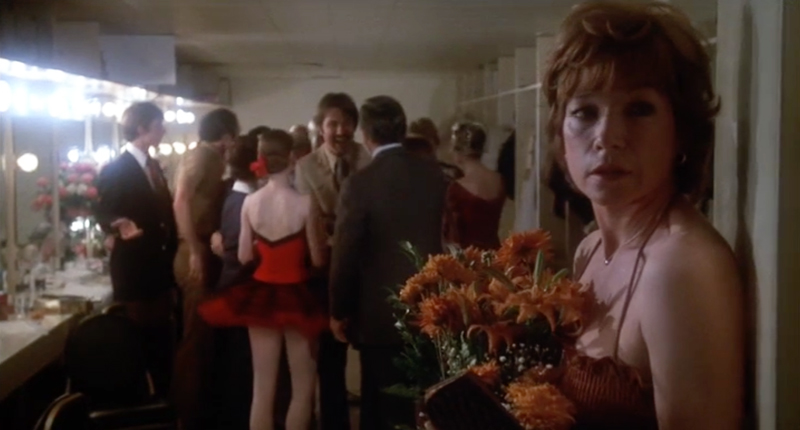 Best Shot.
Best Shot.
But honestly, the movie is too muddled to really nail that. So my choice for best shot is something simpler but quite impactful, even with its beigeness and muted lighting. The movie has spent so much time focusing on DeeDee's restless reluctance to make peace with her now decades-old decision to become a mother and leave the stage, and her envy of both her daughter and her best friend Emma (Oscar nominated Anne Bancroft, who is sensational so I apologize that these shots don't focus on her!) that even after a sweet mother/daughter moment with the flowers, in what should be the happiest scene for all involved, she turns away from the party. It's a wonderfully composed stinging image; DeeDee is never happy with where she is.
And as she turns away from the joyful gathering behind her, the one she should be enjoying celebrating both her passion (ballet) and her beloved daughter, we know exactly what she's looking at, before the editor even cuts there. It's Emma, just as lonely and struggling, in the darkness of an empty stage.
BEST SHOT 77 - WANT MORE?
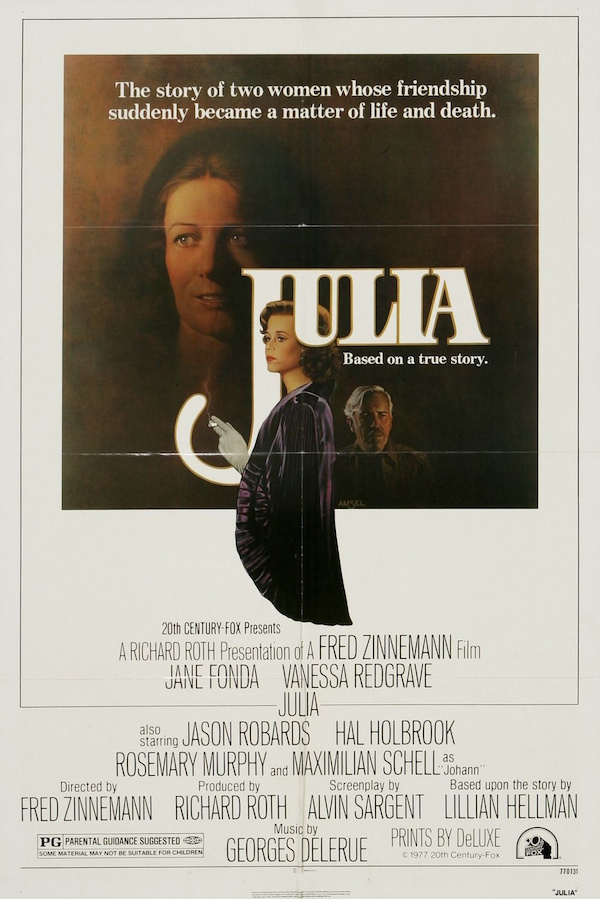 Here are other articles from this weeklong party celebrating the Films of 1977:
Here are other articles from this weeklong party celebrating the Films of 1977:
• Dancin Dan on Film gazes at Julia
• Timothy Brayton who has really gone the extra mile with writeups on nearly the whole category already!
• Christian Bonamusa loves the hats in Julia and the aftermath in The Turning Point
• Film Mix Tape looks at both Islands in the Stream and Close Encounters
• Rachel's Reviews looks at Close Encounters
Up Next: Looking for Mr Goodbar, a must-see time capsule of sexual revolution angst, fear, self-loathing, curiosity, and great performances. You can watch it on YouTube.